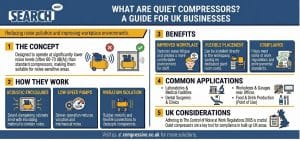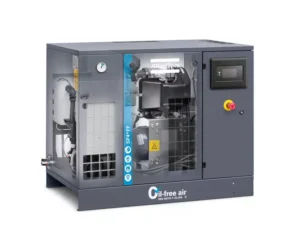What Are Quiet Compressors? A Guide for UK Businesses
Traditional air compressors often produce noise levels above 85 dB(A), the threshold at which UK law requires hearing protection. Prolonged exposure to this level of noise poses not only a health and safety risk but also a legal responsibility for employers.
Quiet air compressors are specifically engineered to overcome this challenge, cutting noise levels to reduce liability while enhancing compliance, safety, and workplace productivity.
This guide explains what quiet compressors are, the technology behind them, and how to choose the right one for your business needs.
The Legal Requirement: Understanding UK Noise at Work Regulations
Noise in the workplace is a legal issue for all employers in the UK.
It’s covered by the Control of Noise at Work Regulations 2005 – a set of legal requirements laid down by the Health and Safety Executive (HSE). The regulations set noise levels at which the law is triggered and an employer requires specific actions.
| Exposure Level | Required Employer Action |
| Lower Exposure Value (80 dB) | Conduct a formal noise risk assessment and provide employees with information and training on noise risks. |
| Upper Exposure Value (85 dB) | Provide and enforce the use of hearing protection. Designate and mark “Ear Protection Zones.” |
| Exposure Limit Value (87 dB) | The absolute legal maximum exposure for a worker, even when accounting for the reduction from hearing protection. |
An investment in a compressor that operates below the 80 dB threshold is a proactive step to engineer this hazard out at the source. It moves a business from reactive compliance to a state of inherent safety.

Quiet air compressors reduce workplace noise improve safety and support UK noise regulations
What Makes an Air Compressor Quiet?
The quiet sound output of a quiet compressor is the result of design intent. No mechanical compressor is perfectly silent.
However, these compressors employ certain technologies to reduce noise. The most critical factor is the manufacturer’s certified decibel rating as measured in decibels (dB(A)).
Inherently Quiet Core Technologies
The biggest contributor to the overall noise level of a compressor is its core technology.
It helps to know the basics. Understanding what an air compressor does – and how the different types work – is essential.
- Rotary Screw Compressors: This type of compressor utilises two interlocking helical screws that do not make physical contact in most designs. This minimises friction, which results in these units being much quieter than traditional piston models. It also allows them to be run continuously in an industrial setting.
- Scroll Compressors: These are widely regarded as some of the quietest air compressors available. They use a fixed spiral and an orbiting spiral to compress air. With very few moving parts, this design generates exceptionally low noise and vibration.
- Rotary Vane Compressors: In this design, a rotor with sliding vanes creates compression chambers – this smooth, continuous motion is much quieter than a piston compressor. Established UK models from brands like Hydrovane offer reliable operation, typically in the 62-69 dB(A) range.
- Advanced Piston Compressors: While traditional reciprocating compressors are loud, modern silenced versions enclose the mechanism in sound-insulated canopies. They also operate at a lower motor speed (RPM) to reduce mechanical noise.
Key Noise-Dampening Features
A low-noise compressor does more than just run quietly. It uses a mix of features that trap and absorb sound.
- Sound-Insulated Canopies: This is a robust steel enclosure. It’s lined with high-density, fire-retardant acoustic foam.
- Vibration Isolation: Specialised rubber or composite anti-vibration mounts. These decouple the compressor from its frame and the floor.
- Low-Speed Motors: Operating the electric motor at a lower speed, such as 1800 RPM instead of 3600 RPM – which helps to reduce mechanical noise.
- Optimised Cooling Systems: Large, low-speed radial fans. Their optimised blade geometry moves air efficiently with minimal acoustic disturbance.
Spotlight on Leading Quiet Atlas Copco Models
As an Atlas Copco Premier Distributor, Search Air provides access to some of the most advanced quiet compressor technology on the market.
- Atlas Copco SF & SF+ Series (Oil-Free Scroll): The SF series is built for noise-sensitive environments. Noise levels as low as 53–55 dB(A) make these machines quieter than a normal conversation. 100% oil-free output is standard, making these compressors frequently specified for medical, dental and laboratory applications.
- Atlas Copco GA VSD+ Series (Rotary Screw): Operating as low as 62–68 dB(A), these units are at the heart of modern, energy-efficient industrial air systems. They feature Variable Speed Drive (VSD) technology, which is capable of cutting energy use in half.
- Atlas Copco LZ Series (Oil-Free Piston): The LZ Series runs at 64–70 dB(A). It delivers ISO 8573-1 Class 0 certified oil-free air. That makes it a strong fit for specialised applications where absolute purity is required.

What Are Quiet Compressors A Guide for UK Businesses
Choosing the Right Quiet Compressor for Your Application
Navigating the different types of air compressors and their uses requires balancing performance with noise requirements.
Defining Your Performance Needs
Before focusing on decibels, you must define your core compressed air needs. Our comprehensive Air Compressor Sizing Guide can help, but the key factors are:
- Airflow (CFM or m³/min): The volume of air the compressor can deliver.
- Pressure (PSI or Bar): This is the force of compressed air required by your most demanding tool.
- Duty Cycle: Some setups only need intermittent use, where a piston compressor is enough. Others call for continuous, 24/7 operation – better handled by a rotary screw design.
Common Applications
- Dental & Medical: These environments require both ultra-low noise and pure, contaminant-free air. Oil-free scroll compressors are the standard solution.
- Automotive Workshops: Garages need robust power. A quieter machine allows for clear communication and a safer working environment. Enclosed rotary screw models provide ample power below the 85 dB(A) HSE threshold.
- Manufacturing & Food Production: Few things are as distracting as a noisy factory floor. Quieter operation means safer work environments. If you make food or beverages, oil-free models meet ISO 8573-1 Class 0 air purity ratings.
- Artisan & Small Workshops: You need to be dialled in when airbrushing or working on a woodshop project. A quiet air compressor allows you to focus on your work, even in residential or nearby areas.
Maintaining Low-Noise Performance
Even a quiet air compressor will only remain that way with the proper care and maintenance. As time passes without proper care, a noisy air compressor will develop air leaks, experience more friction due to worn parts, and produce new vibrations.
Daily user checks are vital, but long-term performance of your investment requires a preventative, professional service plan.
Search Air’s experienced engineers will perform detailed maintenance on your key noise-dampening components, perform diagnostic checks and have your equipment running as quietly and efficiently as it did the day it was installed.
Frequently Asked Questions About Quiet Compressors
How quiet is a quiet compressor?
A quiet industrial compressor has a noise rating of 53 dB(A) – 70 dB(A). 53 dB(A) is actually quieter than a normal conversation (60 dB), and 70 dB(A) is about the same as your household washing machine.
This is considerably less noisy than traditional compressors, which can easily exceed 85 dB(A).
What’s the quietest Atlas Copco compressor?
The quietest compressors in our range are the SF and SF+ oil-free scroll compressors.
Some of our models have noise emission levels as low as 53 dB(A). This allows for their use in noise-sensitive areas. For example, medical clinics or laboratories.
Are oil-free compressors quieter than oil-lubricated ones?
Not necessarily. In most cases, the major determinant of noise level is the core technology of the compressor (scroll, screw, piston), rather than the lubrication method. Oil Vs Oil-Free Air Compressors?
The debate is a complex one. The easiest way is to compare the dB(A) levels of the individual models that you are interested in.
Your Partner for a Quieter, Safer Workplace
A silent compressor can be an investment in your business’s compliance, workplace safety, and employee productivity.
Choosing the correct technology for your business in the UK, a quiet compressor can help you achieve a more pleasant working environment, and allow your operations to run more efficiently.
Speak to the Search Air team to see how a quiet compressor can help you meet compliance, safety and productivity goals.
- Get in touch to receive personalised recommendations and quotes.
- View our range of quiet Atlas Copco compressors.
- Book your consultation today.

